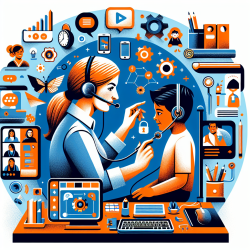The world of healthcare is rapidly evolving, with remote training and telehealth becoming increasingly prevalent. For practitioners in the field of communication disorders, particularly those involved in aphasia research, maintaining research fidelity is crucial. A recent study titled "Maintaining Research Fidelity: Remote Training and Monitoring of Clinical Assistants in Aphasia Research" sheds light on how remote methodologies can enhance clinical skills and ensure the integrity of research.
The Importance of Research Fidelity
Research fidelity refers to the trustworthiness and accuracy of data collected during a study. In aphasia research, maintaining high fidelity is essential to avoid Type III errors—errors that occur due to poor study implementation or investigator bias. This study emphasizes the importance of recruiting and training competent data collectors who are unaware of the study's hypotheses to minimize bias.
The Three-Step Process for Remote Data Collection
The study outlines a meticulous three-step process for remote data collection:
- Selecting and Training Data Collectors: Candidates were interviewed and shortlisted based on their qualifications and previous experience. They underwent comprehensive training, including mock data collection sessions, to prepare them for real-world scenarios.
- Supervising Data Collection and Management: Data collectors recorded each session and shared it with investigators for feedback. This e-supervision ensured adherence to protocols and minimized errors.
- Optimizing Screening/Assessment Fidelity: Detailed manuals and web-based training videos were provided to ensure accurate screening procedures. Continuous monitoring helped maintain high standards of assessment fidelity.
The Impact on Clinical Practice
The study's findings highlight several benefits for practitioners:
- Improved Skillset: Remote training equips practitioners with the skills needed to handle diverse scenarios effectively.
- Cultural Sensitivity: By recruiting data collectors from various regions, the study promoted cultural awareness in clinical practice.
- Cost-Effectiveness: Remote methodologies reduce travel costs and allow for efficient use of resources.
The Future of Remote Training in Healthcare
The success of this remote training model suggests a promising future for telehealth and remote methodologies in healthcare. As technology advances, practitioners can expect more opportunities for professional development through remote platforms.
A Call to Action for Practitioners
This study serves as a valuable resource for practitioners looking to enhance their skills through remote training. By implementing these strategies, practitioners can improve their practice's reliability and contribute to advancing the field of aphasia research.
If you're interested in learning more about this innovative approach to maintaining research fidelity, consider exploring further research or attending relevant webinars and conferences. Staying informed about the latest developments will ensure you remain at the forefront of your field.










